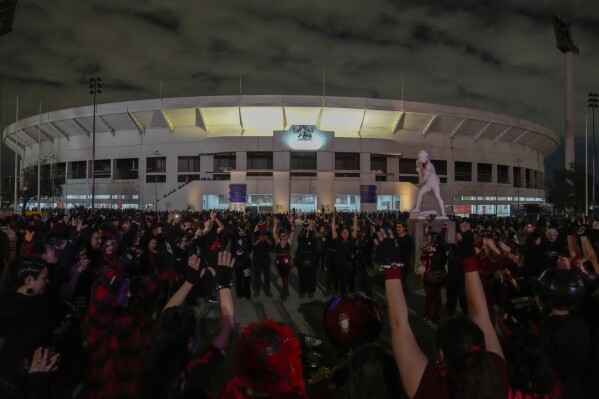Strike over privatizing Sao Paulo’s public transport causes crowds and delays in city of 11 million
RIO DE JANEIRO (AP) — Long lines appeared in Sao Paulo’s bus and subway stations Tuesday as a strike opposing privatization efforts of public transport in South America’s largest city caused delays. Traffic on some routes stalled completely.
Sao Paulo state Gov. Tarcísio de Freitas, who took office in January, called the strike “unreasonable.” He told reporters he had campaigned for looking into privatizations, concessions and “the participation of private capital in public services as a way of bringing investment.”
It was not clear how long the strike would last, and there appeared to be little room for negotiations. The governor insisted that privatization had been the “winning position” in the election and that “to not accept that position is to not accept the results of the polls.”
Camila Lisboa, president of the Sao Paulo Subway Workers Union, which opposes privatization, lamented “authoritarian statements that do not consider the right to strike.” Lisboa claimed that privatization would lead to more expensive fares and poor service — a position also embraced by part of the opposition.
 Live updates | More Palestinians fleeing combat zone in northern Gaza, UN says
Live updates | More Palestinians fleeing combat zone in northern Gaza, UN says
 Dark past of the National Stadium in Chile reemerges with opening ceremony at the Pan American Games
Dark past of the National Stadium in Chile reemerges with opening ceremony at the Pan American Games
 Metal factory explosion in Brazil kills 4 and injures at least 30
Metal factory explosion in Brazil kills 4 and injures at least 30
A court decision had said minimum service should be maintained for the city’s 11 million people during the strike, but that requirement was not respected, Sao Paulo state’s press department said.
Passengers faced long delays Tuesday. Two subway and train lines stopped working.
Federal lawmaker Sâmia Bomfim, of the leftwing PSOL party, warned of privatization, citing the recent blackout in Sao Paulo that plunged the city into the dark for several days. She blamed power distribution company Enel, one of three companies providing electricity in Sao Paulo.
“The population goes without electricity for days because ENEL (privatized) thought only of profit, fired thousands of employees, and ended up not serving (Sao Paulo) when we needed it most,” Bonfim said on X, formerly Twitter.
The lawmaker also criticized the governor for trying to privatize Sao Paulo’s water and waste management company, SABESP, “in a hurry, at a price far below what it is worth, without any social participation, transparency or price adjustment index.”
Disclaimer: The copyright of this article belongs to the original author. Reposting this article is solely for the purpose of information dissemination and does not constitute any investment advice. If there is any infringement, please contact us immediately. We will make corrections or deletions as necessary. Thank you.


